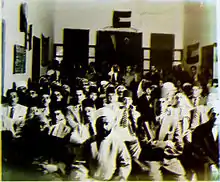Ahmed Hilmi Pasha
Ahmed Hilmi Abd al-Baqi (Arabic: أحمد حلمي عبد الباقي; born in 1883 in Sidon[1][2] - 1963) [3] was a soldier, economist, and politician, who served in various post-Ottoman Empire governments, and was Prime Minister of the short-lived All-Palestine Government in the Gaza Strip.[4] [5]
Ahmed Hilmi Pasha | |
|---|---|
| Prime Minister of the All-Palestine Government | |
| In office September 1948 – 1949 | |
| President | Amin al-Husayni |
| Preceded by | none |
| Minister of Finance of Transjordan | |
| In office 1922–1924 | |
| Preceded by | Madhar Raslan |
| Succeeded by | Hasan Abu Al-Huda |

Early life
Before the collapse of the Ottoman Empire Hilmi attained the rank of General in the Ottoman army. In 1920 he was Minister of Finance for the short-lived Arab Kingdom of Syria in Damascus. He became the finance minister in Transjordan from 1922 to 1924.[6]
In Mandatory Palestine
In 1925, he became the Director General of Awqaf in Mandatory Palestine, the organisation headed by Haj Amin Husseini, which controlled and regulated properties bequeathed to charities under Islamic Law. He later began his banking career when he joined the Arab Bank, which had been established in Jerusalem by Abdul Hamid Shoman in 1930. A few years later Ahmed Hilmi founded his own bank, the Arab National Bank. He was one of the early members of the Istiqlal (Independence) Party which was set up in 1932 and in April 1936 he was named as a member of the Arab Higher Committee becoming its treasurer.[7][8]
In 1937 he, along with other members of the Higher Committee not already in exile, was deported to the Seychelles Islands. In 1939 he was allowed to attend the London Conference at St. James Palace, where he urged the Higher Committee to accept the British proposals later set out in the 1939 White paper. Regarded by the authorities as a moderate, he was allowed back to Palestine in the early 1940s and resumed his post as chairman of the National Bank. He purchased the newspaper Filistin and used it to present Istiqlal policies to the public. The war years were very profitable for the Palestinian economy and the bank had large deposits to invest. In August 1943 he set up the Arab National Fund the purpose of which was to buy land from farmers who were heavily in dept and to encourage the establishment of Awqaf whose proceeds would be allocated to the Fund. By the middle of 1946 the Fund had an income of £P150,000 and owned 15,000 dunams (3,750 acres) of land. It had offices in all the Arab towns and in most of the large villages. Since the Supreme Muslim Council had been abolished the Fund was the only institution offering an alternative to land purchases by the Jewish National Fund. Its success was seen as a threat by followers of the Haj Amin Husseini, who had formed the Palestine Arab Party with most of its leaders in exile. With the end of the war the fund went into decline.[9]

As the situation in Palestine deteriorated, the Arab League tried to impose a united front on the various Palestinian Arab factions. Eventually in January 1947, after four attempts, a five-member Arab Higher Committee was set up, which included Hilmi.[10] Husayin al-Khalidi and Hilmi were the only members of this Committee actually resident in Palestine during 1947 and 1948.[11]
Prime Minister of All-Palestine Government
On 9 July 1948, following the declaration of Israeli statehood, the Arab League set up the Administrative Council for Palestine, chaired by Hilmi. On 22 September the National Assembly was set up in Gaza, with Haj Amin Husseini as President and Hilmi as Prime Minister. The assembly ceased to function following the Israeli army victories in Southern Palestine and the Arab Legion assuming control over Bethlehem and Hebron. In 1949 Hilmi became a district military governor in the West Bank and later he served as the Palestinian representative to the Arab League.[12]
References
- Smith, Pamela Ann (1984) Palestine and Palestinians, 1876-1983. Croom Helm. ISBN 0-7099-2376-7. p.222.
- Cohen, Aharon (1970) Israel and the Arab World. W.H. Allen. ISBN 0 491 00003 0. p.309.
- almadenahnews
- addustour
- Reiter,Yitzhak,Pantheonizing the Jerusalem Haram: from Pan-Islamic to a national Palestinian pantheon,2019
- "Financial Ministers". mof.gov.jo.
- Smith. pp.79,80,131,221,222,236.
- Cohen. p.309.
- Cohen. p.309; Smith. p.80.
- Cohen. pp. 333,334.
- Pappe, Ilan (1994) The making of the Arab-Israeli conflict. 1947-1951. I.B.Tauris. ISBN 1 85043 819 6. p.66
- Smith pp.86,87,90,98,190,234.